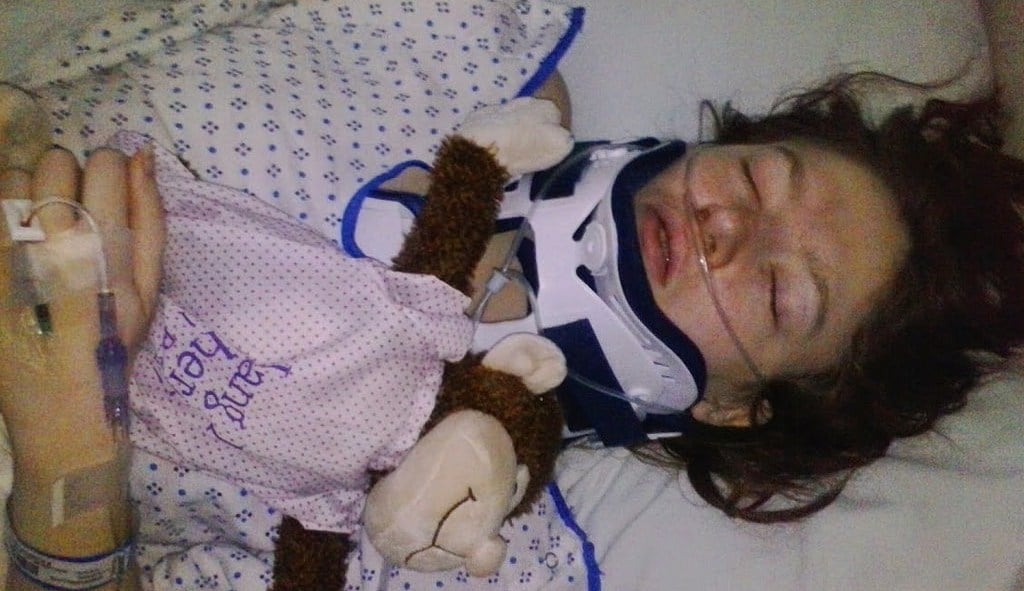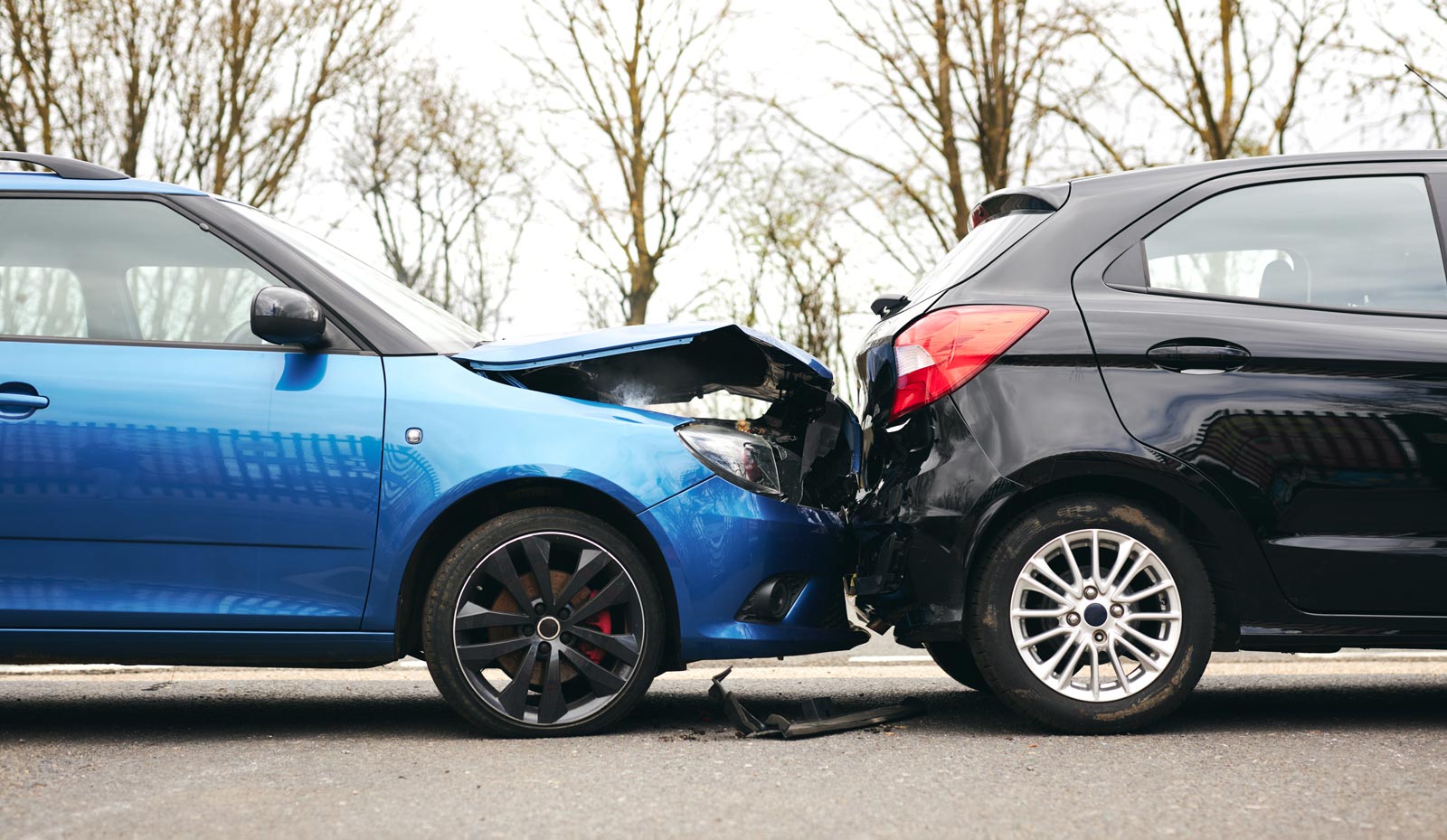
Traumatic Brain Injury
One of the most common and potentially severe injuries that can occur during a car accident are closed head injuries, which can range from a mild concussion to severe traumatic brain injury (TBI). The violent impact of a crash can cause the brain to move within the skull, causing bruising and internal bleeding – even if there are no external signs of an injury. If you’ve been involved in a car accident, it’s best to have a medical professional screen you for TBI, as these injuries present in varying degrees and with many different symptoms. If left untreated, TBI can have life-threatening consequences. For more information about TBIs, you can check out our TBI infographic.
Neck Injuries
Neck injuries are also commonly experienced by those involved in a car accident. These injuries can include sprains, pinched nerves, and herniated discs. Sprains and strains are the result of muscles in the neck being suddenly stretched or torn; this is commonly referred to as whiplash. Pinched nerves (or cervical radiculopathy) are caused by the nerve being irritated by a bone spur or herniated disc, which can cause muscle weakness, skin numbness, and/or pain in the area to which the nerve travels. Lastly, herniated discs result when the neck’s motion places too much pressure on a disc. Sometimes referred to as “slipped” or “ruptured” discs, the pressure against the spinal nerve can cause numbness and pain.
Like TBI, neck injuries are not always immediately apparent following an accident. This could be due to the sudden surge of adrenalin that often accompanies a traumatic event or the fact that neck injuries can present in other parts of the body such as your upper extremities. If you are experiencing any of the following symptoms, you should be screened for possible neck injuries by a medical professional:
- Neck pain
- Limited or reduced range of motion in your neck
- Muscle spasms in your neck
- Headaches
- Pain, weakness, and/or numbness in your shoulders or upper extremities
Back Injuries
Many people who suffer back injuries are quick to dismiss them, which can often lead to disastrous consequences. Our bodies are not designed to withstand the impact of a car accident – even a minor one – and our backs often pay the price.
The human back consists of a series of vertebrae, many different muscles, and the spinal cord. Injuries sustained in the upper back (thoracic spine) are usually the most serious and often result in permanent nerve damage. The lower back (lumbar spine) is the most muscular section, which means that it provides the most protection for the spinal cord, but because of the size of these muscles, it also means that sprains to this region are often the most painful. As is the case in the neck, herniated discs are commonly caused by car accidents and can result in a great deal of pain and discomfort, as well as numbness in the lower extremities. Lastly, and most seriously, spinal cord injuries can have severe consequences that can lead to permanent disability. These injuries can also lead to secondary conditions such as infection, clotting, pneumonia, internal bleeding, and spinal fluid leaks.
Many back injuries are relatively minor and can be treated with therapy and/or medication. However, other forms are extremely dangerous, meaning that anyone involved in an accident and experiencing back pain or numbness in the extremities should undergo diagnostic imaging to determine the severity of the injury and to determine the best course of treatment.
Psychological Injuries
An often-overlooked outcome of car accidents is the emotional toll that they can take on the individuals who endure them. Post-traumatic stress disorder is commonly experienced by car accident victims and can cause people to experience anxiety and inappropriate flight-or-flight responses. These psychological and physiological responses can be instrumental in surviving a traumatic event, but they can also cause severe mental and emotional conflicts when experienced in more casual and innocuous environments and circumstances.
There are 4 primary symptoms related to PTSD:
- Intrusion: this involves incessant flashbacks to the event itself.
- Numbing: the victim will use emotional distance as a form of protection, leading to isolation, depression, and inability to feel emotion.
- Avoidance: this involves the desire to shun people, places, memories, activities, etc. associated with the traumatic event.
- Arousal: this is a state of constant alert during which the victim can experience heightened anxiety, paranoia, and the inability to sleep.
PTSD can be a debilitating condition without a clear or simple solution. Certain individuals may not even be diagnosed with the condition until long after the event, as symptoms have a tendency to remain latent until triggered. Many people can overcome their experiences with medication and/or therapy; however, others may suffer from PTSD for the remainder of their lives. It is serious condition that deserves a great deal of attention and support.
At Crosley Law Firm, we urge you to be a conscientious driver at all times, but we understand that certain events are simply unavoidable – especially when you are not at fault. We have years of experience in personal injury law and may be able to help you or a loved one who has been injured by a traveler not following proper safety guidelines or traffic regulations. Our knowledgeable staff has a wealth of experience with these cases and can offer expert legal advice and strategy should you choose to pursue legal action. No two cases are ever the same, so please visit our website or call us today at (877) 535-4529 to learn more about the Crosley approach and to schedule a free consultation.








